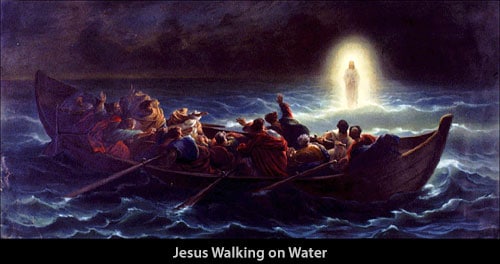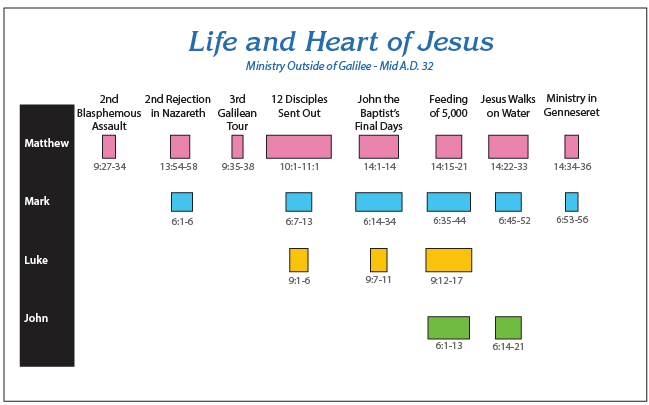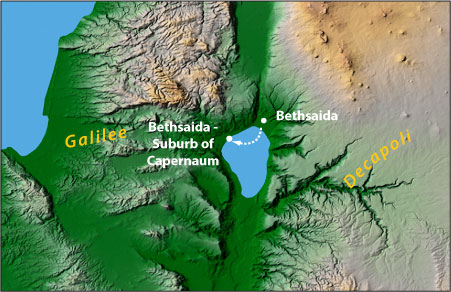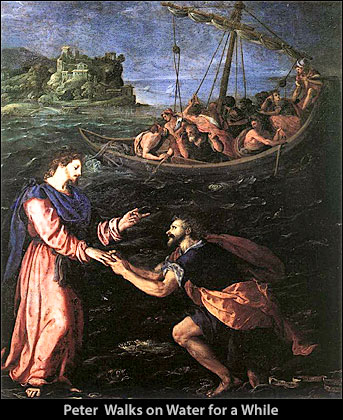After Jesus fed the 5,000 men plus women and children near the city of Bethsaida, the people believed that He was the prophet promised by Moses (John 6:14). Moses had predicted that a prophet would come in the future, and the Jewish people believed that the prophet would be the Messiah (Deuteronomy 18:15). They expected the Messiah would come with new teaching and power, and Jesus did (Mark 1:27). They could not believe what they had seen early in His ministry, and they were astonished that He was able to create food. Feeding so many people was more than just a miracle. It was another sign that Jesus was the Messiah (John 6:14).
Therefore when the people saw the sign which He had performed, they said, “This is truly the Prophet who is to come into the world.”
The miracle was so significant, and the response of the people was so great that all of the gospel writers included it in their memoirs: Matthew, Mark, Luke, and John.

Make Jesus King
The crowd was energized and excited with visions of bread and fish in their heads and thoughts of more. As a result, the people wanted to make Jesus their king by force.
So Jesus, perceiving that they were intending to come and take Him by force to make Him king . . . John 6:15 (NASB)
But Jesus knew their thoughts. They did not know that their plans were not God’s plans. Apparently, the disciples were also taken up with thoughts of Jesus becoming king. We do not know for sure, because none of the gospels tell us, but yet we are told that Jesus “made” the disciples leave.
Immediately Jesus made His disciples get into the boat and go ahead of Him to the other side to Bethsaida . . . Mark 6:45a (NASB)
The Greek word that is translated as “made” actually means “to force, compel, or insist.” This suggests that the disciples did not willingly leave. Jesus had to “force” them to leave. Only then was He able to deal with the crowd and send the people away.
. . . while He Himself was sending the crowd away. After bidding them farewell, He left for the mountain to pray. Mark 6:45b-46 (NASB)
Then Jesus retreated to a mountain in order to escape and to be alone (Matthew 14:23).
The Horrible Storm
When Jesus “forced” the disciples to leave He had ordered them to get into a boat and go to the town of Bethsaida, which appears to have been a suburb of Capernaum. There were two cities called Bethsaida – one northeast of the Sea of Galilee and one near Capernaum. Jesus had sent the disciples out onto the Sea of Galilee in a boat without Him.
The gospels of Mark and John tell us that in the darkness of the evening with the disciples a long distance from land, a raging storm on the Sea of Galilee started battering the boat and the men.
It had already become dark, and Jesus had not yet come to them. John 6:17b (NASB)
But the boat was already a long distance from the land, battered by the waves; for the wind was contrary. Matthew 14:24 (NASB)
The Greek word that is translated as “battered” actually means “tortured or tormented.” That is, the boat was being severely beaten by the wind and waves. I wonder how the disciples felt being all alone without Jesus, who was still on the land? The gospel of Mark adds that the disciples were straining on the oars. Even though they were experienced seamen, this storm was still very difficult.
Jesus was still on the seashore when He saw the disciples straining on the oars.
When it was evening, the boat was in the middle of the sea, and He was alone on the land. Seeing them straining at the oars, for the wind was against them, at about the fourth watch of the night . . . Mark 6:47-48a (NASB)
He saw them at the fourth watch of the evening even though they were 3-4 miles away (John 6:19). The Romans had four night watches. The first watch occurred between 6 pm to 9 pm. The second watch was from 9 pm to 12 am. The third watch began at 12 am and went to 3 am, and the fourth watch was 3 am to 6 am. It was dark and the disciples had been struggling a long time. The trip from Bethsaida, northeast of the Sea of the Galilee, to the Bethsaida in the suburbs of Capernaum should not have taken all night. The storm had delayed their trip.
Two Miracles
Finally, Jesus came to help them – walking on the water. He did not come to them in a boat, by swimming, but with only His sandals, taking one step after another upon the water. No rocks in the middle of the Sea of Galilee. There was just water and Jesus! I would have liked to have watched Jesus do it.

. . . He came to them, walking on the sea . . . Mark 6:48b (NASB)
Some critics suggest that Jesus was not walking on the sea but along the seashore, and the disciples were just confused. Such a suggestion ignores facts recorded in the gospels: namely, that Jesus saw the disciples in the darkness of the night through a storm when the disciples were three to four miles away from the seashore. Therefore, we conclude that the disciples would not have been able to see Jesus on the seashore It is a miracle that Jesus saw them, and the fact that He walked on the water was the second miracle. The first one might be the greater miracle. Such critics need better explanations.
Jesus finally came near to the boat. Rather than coming straight to the boat, He started to walk by them.
. . . and He intended to pass by them. Mark 6:48c (NASB)
Why did He do this? We do not know because we are not told. But it appears that Jesus was testing the disciples.

Response of The Disciples
How did the disciples respond? Were they hooting and hollering and cheering Jesus on because He was walking on the water? No! They had a different reaction.
But when they saw Him walking on the sea, they supposed that it was a ghost, and cried out; for they all saw Him and were terrified . . . Mark 6:49-50a (NASB)
Matthew adds,
. . . they were terrified, and said, “It is a ghost!” Matthew 14:26 (NASB)
We could try to accuse the disciples of many things, but we should not ever accuse these brave, burly, experienced seamen of being cowards. They do not deserve such insults. They responded like this because they had never seen someone walking on water. How would you have responded if you had been one of the disciples in the boat that night with the winds ripping through the rigging and across your face, with your clothes soaked with sea water, and your muscles tired from trying to save your life and your friends? Then in the middle of your struggle, all of a sudden you see someone walking on water. What would you think? When Jesus heard their reaction, He tried to calm their fears.
But immediately Jesus spoke to them, saying, “Take courage, it is I; do not be afraid.” Matthew 14:27 (NASB)
Peter Walks On Water
Hearing Jesus’ voice was all that was needed to calm their fears. They knew His voice, and they knew that He cared. With their fears calmed, all of a sudden Peter had a wonderful and thrilling idea.
Peter said to Him, “Lord, if it is You, command me to come to You on the water.” Matthew 14:28 (NASB)
In the Greek language, there are four classes of “if” statements of conditions. When Peter said, “If it is You,” he was not saying that he was not sure that the one walking on water was Jesus. He uses what is called a “first class condition” or “if statement.” It speaks of certainty. What Peter said was, “Since it is You, command me to come to you on the water.” Peter had confidence in Jesus. Just like a kid, Peter wanted to try walking on water. Jesus indulged his wish.
And He [Jesus] said, “Come!” And Peter got out of the boat, and walked on the water and came toward Jesus. But seeing the wind, he became frightened, and beginning to sink, he cried out, “Lord, save me!” Matthew 14:29-30 (NASB)
Peter walked on water for a few minutes, but his fun was soon to end when he started sinking. Peter did not start to sink because he had an evil heart. Instead of an evil heart, Peter had a great passion for Jesus. Peter will promise to defend Jesus in the future. He will be rebuked for not wanting Jesus to die. He will be told to put his sword away after cutting off a servant’s ear when Jesus is arrested. He will be invited to the Mount of Transfiguration. No! Peter had a good heart. He was a good man. He was just short on faith! Jesus quickly told him that was his problem.
Immediately Jesus stretched out His hand and took hold of him, and said to him, “You of little faith, why did you doubt?” Matthew 14:31 (NASB)
Did you notice that Peter started sinking after he became afraid? Faith and fear do not go together. When we are fearful, we are lacking faith. Show me someone who fears, and you will find someone who is not trusting God. Unfortunately, we all have this problem on occasions. I wonder if any of the other disciples thought that Peter had a wonderful idea and wanted to walk on water too? I doubt that any wanted to try after Peter failed.

Hard Hearts
After Jesus rescued Peter, they got into the boat together and the storm stopped.
Then He got into the boat with them, and the wind stopped; and they were utterly astonished, for they had not gained any insight from the incident of the loaves, but their heart was hardened. Mark 6:51-52 (NASB)
Even though they had confidence in Jesus, they really did not understand that He was God. As a result they were still astonished by the miracles of Peter and Jesus walking on the water and the storm being stopped. The fact that they were astonished reveals that they did not understand that Jesus could control the laws of universe. We are told that the disciples had not learned any more about Jesus from the feeding of the 5,000 men. They were absolutely clueless. The reason is that they had hard hearts. They just did not get it! Now if the disciples could be eyewitnesses to the miracles that Jesus had performed when 5,000 people were feed and yet missed the truth about Him, then it is possible for you and me to read the Bible and miss key truths about Him too! If the disciples could have hard hearts, then we can too! If those who walked and talked with Jesus missed the truth, then we should not think that we are immune. They were thrilled with simple evidences but did not move to the next level of understanding about what the evidence pointed to: that Jesus was God.
When the storm stopped, then they understood that Jesus was God. Then they responded by worshipping Him.
And those who were in the boat worshiped Him, saying, “You are certainly God’s Son!” Matthew 14:33 (NASB)
And then another miracle occurred,
. . . and immediately the boat was at the land to which they were going. John 6:21 (NASB)
Conclusion
What an account! Jesus had performed an incredible miracle that should have helped them see that He was divine, that He was God. But instead they saw something else! He could multiply food and feed 5,000 men plus women and children! They did not learn the correct lesson. Their hearts were not sensitive. They missed the most obvious truth. Their hearts were missing spiritual humility; as a result, Jesus gave them another opportunity to learn the truth. The hearts of the disciples were not sensitive to spiritual things. They were more interested in what Jesus could do for them than in the real message of the event.
Apparently they argued with Jesus, and He had to force them into a boat. Jesus waited for a disaster to occur out on the dark, stormy, sea. He waited until they were worn out, tired, and exhausted. He came close to the boat and then started to walk by until they panicked and called out. Then bold, silly Peter wanted to walk on water. Amazingly, Jesus accommodated his request and then rescued him when he failed.
Neither Peter nor the rest of the disciples learned the most important lesson. The primary lesson was not that Jesus could feed a large crowd with two fish and five loaves, that Jesus could walk on water, that Jesus could help Peter to walk on water, or that Jesus stilled the storm. It is amazing how we can read and study the Bible and then think we have learned the message of the passage. We often come away with the wrong lesson because we are looking for the wrong things. The real lesson, the real truth, the purpose of what the disciples should have learned was that Jesus is God. The lesson was not about food.
They did not have sensitive, spiritual hearts and they were not very humble. Remember that they had their own goals. They had argued with Jesus. Sometimes our goal in studying the Bible is selfish – what can I get from it? The goal of Bible study is not what Jesus can do for me – can He multiply fish and loaves of bread for me? The goal of reading and studying the Bible is not that I can demonstrate my Biblical knowledge. The goal of reading and studying the Bible is the discovery of the message of the passage! What is God trying to reveal to me through His Holy Spirit? May your prayer be, “Lord show me the meaning of the passage, even if there are no loaves of bread or fish for me!”